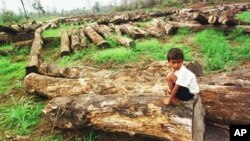PHNOM PENH - The number of threats against human rights workers in recent months has become a major concern, the rights group Adhoc said Tuesday.
Adhoc counts as many as 48 cases of rights workers being threatened or otherwise intimidated, especially those monitoring the environment and natural resources.
In many of these cases, local authorities are to blame, Thun Saray, Adhoc’s president, told reporters Tuesday. Meanwhile, human rights violations, land encroachment and illegal logging go ignored, he said.
“In many cases, local authorities do not use their power to help people, but they use their power to threaten or intimidate everyone, not to go against their bad activities,” he said.
The judicial system has become increasingly used by powerful officials and business owners as a means of threatening local residents, Adhoc said.
Mom Sakhin, 48, a villager from Kratie province, has been in Phnom Penh to seek help from local organizations, after she and fellow villagers burned illegal timber they found harvested near their homes. She said she has been threatened by local officials in her area, which has been deforested thanks to a land concession.
“Almost all the forest in my village has already been cut down by company owners who give bribes to the police and authorities there,” she said. “When people who dare volunteer to protect their natural resources, they are being intimidated by those authorities, while the police do not take action against those who are illegally logging.”
Tith Buncheurn, a villager from Battambang, said he had been in prison twice in a land dispute with local authorities. Often, the representatives of local residents are the ones jailed, he said.
“Some representatives were sentenced to two years in prison and were asked to pay 40 million riel, [more than $10,000],” he said. “We are so poor. How can we pay that amount of money? We have never seen a poor man who could win at court.”
A government spokesman dismissed the Adhoc report, saying he disagreed with the results.
Adhoc counts as many as 48 cases of rights workers being threatened or otherwise intimidated, especially those monitoring the environment and natural resources.
In many of these cases, local authorities are to blame, Thun Saray, Adhoc’s president, told reporters Tuesday. Meanwhile, human rights violations, land encroachment and illegal logging go ignored, he said.
“In many cases, local authorities do not use their power to help people, but they use their power to threaten or intimidate everyone, not to go against their bad activities,” he said.
The judicial system has become increasingly used by powerful officials and business owners as a means of threatening local residents, Adhoc said.
Mom Sakhin, 48, a villager from Kratie province, has been in Phnom Penh to seek help from local organizations, after she and fellow villagers burned illegal timber they found harvested near their homes. She said she has been threatened by local officials in her area, which has been deforested thanks to a land concession.
“Almost all the forest in my village has already been cut down by company owners who give bribes to the police and authorities there,” she said. “When people who dare volunteer to protect their natural resources, they are being intimidated by those authorities, while the police do not take action against those who are illegally logging.”
Tith Buncheurn, a villager from Battambang, said he had been in prison twice in a land dispute with local authorities. Often, the representatives of local residents are the ones jailed, he said.
“Some representatives were sentenced to two years in prison and were asked to pay 40 million riel, [more than $10,000],” he said. “We are so poor. How can we pay that amount of money? We have never seen a poor man who could win at court.”
A government spokesman dismissed the Adhoc report, saying he disagreed with the results.








